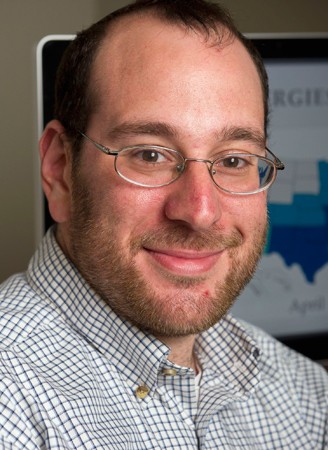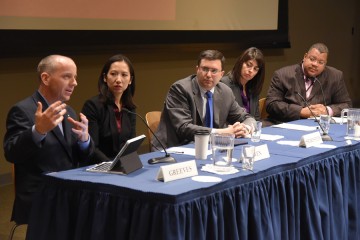A Johns Hopkins computer scientist is part of a team of researchers that has developed a new way to understand vaccine refusal by studying an unlikely resource: Twitter.

Image caption: Mark Dredze
The researchers will combine Twitter analyses with traditional survey techniques to study why people refuse vaccines and how these reasons vary among communities. The focus on vaccination is particularly timely, with a severe flu season underway and recent well-publicized outbreaks of vaccine-preventable illnesses, including a measles outbreak that has sickened people in 17 states and Washington, D.C., and several cases of mumps among National Hockey League players.
Mark Dredze, assistant research professor in the Department of Computer Science at Johns Hopkins University, will develop new computer algorithms to support the team's research.
"We hope to gain insights into people's reasoning about vaccines by automatically processing millions of Twitter messages," Dredze said.
Dredze has previously worked on studies that analyzed tweets to help track flu outbreaks and mental illness trends. He will use similar techniques to help researchers from two other universities—George Washington and Georgia—gather data on messages mentioning concerns about vaccines.
"People really do tweet about everything, and conversations about vaccines are no exception," said David Broniatowski, assistant professor in the School of Engineering and Applied Science at the George Washington University, who will co-lead the study on vaccine refusal patterns. "Parents and patients freely share their fears and concerns about vaccines. While it typically takes years to collect meaningful information about why people refuse vaccines, using surveys and searching Twitter brings immediate results."
Added Karen Hilyard, assistant professor in the College of Public Health at the University of Georgia, who also will lead the study: "Survey data tend to draw from older, white, rural households, whereas younger, urban minorities are overrepresented on Twitter. These two techniques complement each other perfectly."
Since receiving a grant last month, Broniatowski, Hilyard, and Dredze have already analyzed millions of tweets to gather information on sentiment toward flu vaccinations. The team identified tweets, geo-located the messages, and compared their findings to the Centers for Disease Control and Prevention's Behavior Risk Factor Surveillance System. Their results show that states with a higher number of residents who received the flu shot had a higher number of vaccine-positive messages on Twitter.
"This was really surprising and exciting," Hilyard said. "It shows that we can get this type of information from Twitter faster, cheaper, and more easily. Frankly, it's a game changer when it comes to health surveys, especially as we dig deeper to examine more complex attitudes and beliefs among different demographic groups."
Using social media to reveal thinking about vaccines in real time will help health officials to better respond to the next outbreak, saving lives and keeping people healthy. It will also be a boon for science, helping researchers quickly home in on those tough questions that need further examination.
"The dream would be to get ahead of the next outbreak," Broniatowski said. "How can we take what we learn here and better educate parents about the merits of vaccines and other public health decisions that seem risky? If we could do that, then hopefully we'd be able to prevent the next measles outbreak."
Other researchers in the study include co-investigators Eili Klein, assistant professor at the Johns Hopkins School of Medicine; Joshua Epstein, professor of emergency medicine at Johns Hopkins; and a consultant, Sandra Quinn, professor of family science at the University of Maryland. The award was funded by a five-year, $1.6 million grant from the National Institute of General Medical Sciences of the National Institutes of Health.
Posted in Health, Science+Technology
Tagged computer science, vaccines, twitter, mark dredze









